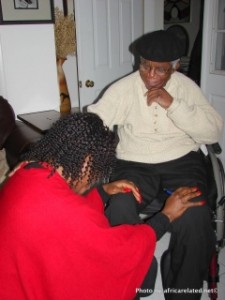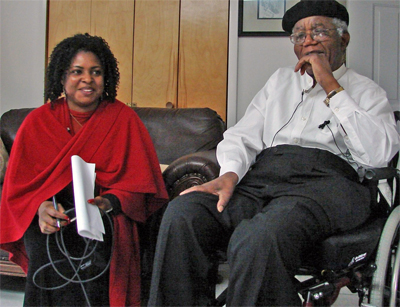A Tribute to Chinua Achebe, 1930-2013
by Joyce Ashuntantang
It is difficult to know where to begin to pay tribute to the Eagle on the Iroko, but fortunately he gave me “a mouth with which to tell my story.” He unchained my African tongue from its colonial hinges, so I could confidently say “My spirit tells me” instead of “I have a hunch.” Chinua Achebe has to his credit more than thirty published works of fiction, poetry, children’s literature, critical essays and non-fiction including the recently published There Was a Country: A Personal History of Biafra, which have continued to shape the trajectory of African literature around the world. Many times in his life, Chinua Achebe explained he was driven to write stories to combat the stereotypes of Africans in western narratives of Africa. He clearly identified his mission as a writer: “…to help my society regain its belief in itself and put away the complexes of the years of the denigration and self-abasement.” Even more fascinating, was his invention of a new dialect of English which many African writers adopted for their fiction. So today, three days after the news spread to the whole world that Omenka, the master artist, has breathed his last, my spirit tells me: All is well; the master still lives.
Like many other Cameroonians, I first encountered Chinua Achebe in a secondary school classroom. Interestingly, I read his third novel, Arrow of God before Things Fall Apart. Although later I found out that Achebe’s craft in Arrow of God is more sophisticated than in Things Fall Apart, the charm of Achebe’s first novel encircled me and has never left. As a young student in secondary school, I memorized the different Igbo proverbs in the novel, imagined Obierika was my Dad, worried about Ezinma’s survival and mourned for Ikemefuna. In fact recently I wrote a short story where I reversed the decision to kill Ikemefuna. I can see Achebe smiling over my foolhardiness. Somehow, Achebe’s manner of writing which was in sync with my immediate reality gave me a satisfaction which I could not get from all the British fiction I was familiar with at the time. As an undergraduate student at the University of Yaoundé, I worshipped copies of African Literature Today, and other critical sources of African Literature, where I devoured essays on this novel written by the likes of Bernth Lindfors, Solomon Iyasere, C.L. Innes, Abiola Irele, Ernest Emenyonu, and Eustace Palmer.
In fact, at every point in my academic life, I found a new reason to be fascinated by Achebe’s masterpiece. At the University of Wales where I was a graduate student pursuing a degree in librarianship I was introduced to the value of manuscripts and the importance of archives. As I studied and evaluated manuscripts of British writers who had lived over a hundred years ago, I had a burning urge to see the raw manuscript of my favorite text, Things Fall Apart. At the time this novel was only thirty-four years old, so my desire seemed like it would be easily satisfied. I spent several hours in the library each day searching different catalogs trying to locate the manuscript. I imagined that since the novel was published by Heinemann the manuscript could be somewhere in England especially since I found other manuscripts by African writers published by Heinemann at Reading University library. I wanted to see my favorite sentences and phrases in Achebe’s own hand. I wanted to know how long it took him to write this manuscript. I wondered whether he started re-writing it again when he feared it was lost in London. I wanted to see the words or phrases he cancelled and whether anything did not make it to the final print. And then more than anything else I wanted to read the very first manuscript which went beyond the story of Okonkwo. Achebe had written a story which included three generations of Okonkwo’s family when he was in London. After Gilbert Phelps, a novelist working as a producer with BBC at the time showed the novel to his publisher, they liked it and wanted to start working on the novel, but Achebe had second thoughts. He realized the novel was “too thin” to carry the weight of three generations. He decided to split the story into three separate stories in a trilogy. He later published the first story as Things Fall Apart and the story of Okonkwo’s grandson, Obi Okonkwo in No Longer at Ease. The middle story never got published and it has remained a mystery.
It was therefore not a coincidence when my doctoral dissertation included tracking down the publication and dissemination patterns of African/Cameroonian literature. It is during this time that I discovered through the intervention of the erudite scholar, Bernth Lindfors that I had not been able to find the manuscript because it is missing. My search finally led me to meet Chinua Achebe in 2008 and what a meeting it was! The magic of his presence and the profound wisdom in every word he uttered quenched the thirst I had carried for years. He answered all the questions I could ask and more. Encouraged by that memorable encounter, I embarked on a full scale search. Coincidentally, the manuscript could be in Cameroon because Achebe gave it to a Cameroonian scholar who needed it for a research project. The Search is still on! Whether I will find the manuscript or not is not clear at this time, but the search has taken a life of its own and it is interesting to see it evolve.
That is the nature of my fascination with the novel Things Fall Apart and the artistic ability of Chinua Achebe.
And today, Chinua Achebe is dead. If I had my way, he would have lived forever, but one thing I know for sure, I am in a much better place than Okonkwo’s bosom friend, Obierika, at the end of Things Fall Apart. During the scene behind Okonkwo’s house where his body has been discovered hanging on a tree, there is an uneasy silence, and “Obierika, who had been gazing steadily at his friend’s dangling body, turned suddenly to the District Commissioner and said ferociously: ‘That man was one of the greatest men in Umuofia. You drove him to kill himself; and now he will be buried like a dog.’” Today I think of the lifeless body of the trailblazer, Chinua Achebe awaiting burial and I can scream with triumph: “That man was one of the greatest men in Nigeria, Africa, you drove him to tell stories and now he will live forever.”
Chinua Achebe will continue to speak to me and others around the world through his stories. The global reaction to his passing testifies to this. As Achebe explains in his novel Anthills of the Savannah, “The story is our escort; without it, we are blind.” My eyes have been opened forever!

After my 2008 interview, I went down in front of the Master Artist and asked for his blessings. He was amused, but blessed me all the same…


